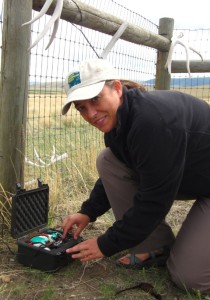
Affiliate Fish, Wildlife and Conservation Biology faculty member and Wildlife Conservation Society Associate Conservation Scientist Sarah Reed has been elected to the Society for Conservation Biology’s Board of Governors to serve as vice president for Programs for a four-year term beginning July 1.
“It’s an honor to be elected to the Board of Governors,” Reed said. “I’ve known since graduate school that SCB is the society I wanted to invest in. I have benefited greatly from their programs, so I am glad to be able to give back to them.”
Society for Conservation Biology
Founded in 1985, the SCB is an international professional organization dedicated to promoting the scientific study of the phenomena that affect the maintenance, loss, and restoration of biological diversity. The organization has chapters throughout the world, including a student chapter at Colorado State University in the Warner College of Natural Resources. The SCB publishes the journals Conservation Biology, Conservation Letters, and contributes to several affiliate publications, including the popular magazine, Conservation.
Reed has been an active member in the organization since 2001 when she joined as a member of the U.C. Berkley chapter. She went on to be the co-president of that chapter in 2002, and received the Smith Conservation Research Fellowship in 2009. She served on the North American Section Board of Governors from 2011 to 2014.
Reed’s responsibilities as vice president of Programs will include managing the policy, development and publications committees. In this role she hopes to address some of the SCB’s current challenges.
Generating applied science
“I’d like to ensure that we can recruit and retain a membership that is diverse and integrated across race, gender, methodology and perspective, and help ensure that our members generate science that is applied in the conservation field.”
Reed’s strategy includes identifying common metrics to assess the on-the-ground impacts of conservation research, encouraging employers and funding organizations to reward scientists for those impacts, and creating additional opportunities for early- or late-career scientists similar to the Smith Conservation Research Fellowship.
“There are a great number of professors, researchers, and students at CSU who are a part of SCB,” Reed added. “I want to make sure that our community here is well connected to the organization, and I am looking forward to hearing feedback and input from people here about where SCB is headed.”